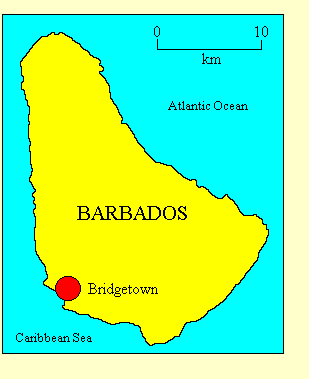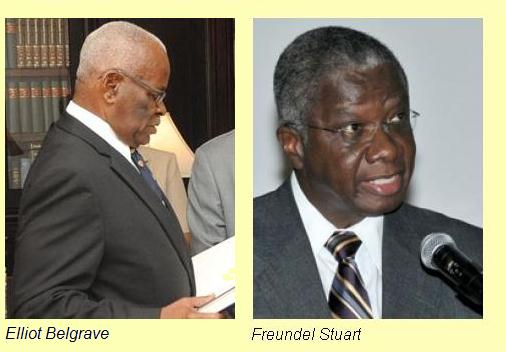
BARBADOS
Official name: Barbados
• Location: Caribbean
• International organisations: African, Caribbean and Pacific Group of States, Commonwealth of Nations,
Non-Aligned Movement, Organisation of American States, United Nations, World Trade Organisation.
• Borders: None
• Coastline: Atlantic Ocean, Caribbean Sea
• Land area: 431 Km2
• Population: 280,000
• Annual GDP (PPP) per capita: US$21,800 (2009 CIA estimate). World ranking: 46
• Ethnicity: More than 90% of the population are of African descent. There are small European and Indian minorities.
• Languages: English is the official language and is generally understood. Most of the
population speak a creole called Bajan.
• Religion: Over 70% of the population are Christian, the large majority Protestant.
There are small Moslem and Hindu minorities.
• Form of government: Constitutional monarchy and parliamentary democracy. Barbados is
divided into eleven parishes.
• Capital: Bridgetown
• Constitution: The
Constitution of Barbados came into effect on 30 November 1966.
• Head of state: Queen Elizabeth II, Queen of Barbados. The Queen came to the British
throne on 6 February 1952, and has held the title Queen of Barbados since 30 November 1966.
The Queen's functions in Barbados are excercised by a Governor-General, appointed by the
Queen on the advice of the Prime Minister.
Elliot Belgrave has been Acting Governor-General
since 1 November 2011.
• Head of government: The Prime Minister, appointed by the Governor-General. The Prime Minister is the
leader of the largest party in the legislature and is accountable to it.

• Legislature: Barbados has a bicameral legislature, the
Parliament of Barbados. The House of
Assembly has 28 members, elected for five-year terms from single-member constituencies.
The Senate has 21 appointed members.
• Electoral authority: The Electoral and Boundaries Commission conducts national elections. The commission does not have
a website, but Barbados election information can be found at
Barbados Elections.
• Freedom House 2011 rating: Political Rights 1, Civil Liberties 1
• Transparency International Corruption Index: 78% (17 of 178 countries rated)
• Reporters Without Borders Press Freedom 2010 Index: 83.5 (57 of 178 countries rated)
(this is a group rating for the Organisation of Eastern Caribbean States)
• Heritage Foundation Economic Freedom 2010 Index: 68.5% (42 of 178 countries rated)
Political history
Barbados was settled by the British in the 1620s and became a Crown Colony in 1663. It was
populated with African slaves to work the sugar plantations. Slavery was abolished in 1834 but
the white landowners continued to dominate the island. Constitutional development began
after the Second World War, with an elected legislature and responsible government
following in 1954. Following the failure of the Federation of the West Indies Barbados
became independent in 1966.
The movement for self-government in Barbados was led by Grantley Adams, who founded
the
Barbados Labor Party in 1938. Since independence the
BLP has alternated in power the more conservative
Democratic Labour Party. The DLP was in power
from 1976 to 1994, followed by the BLP under Owen Arthur from 1994 to 2008. The DLP returned to power under
David Thompson in January 2008. He died in October 2010 and was succeeded by
Freundel Stuart.
Updated November 2010
|

